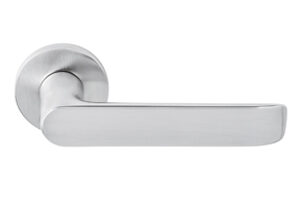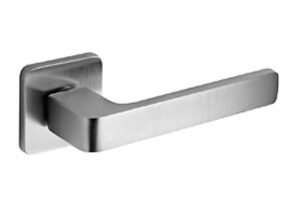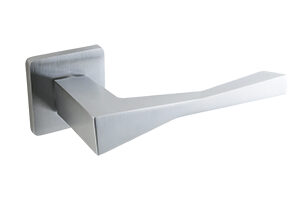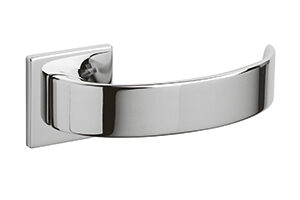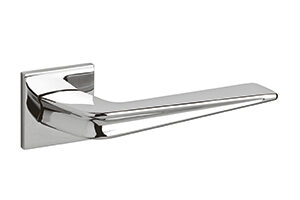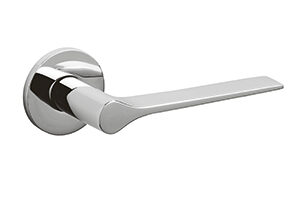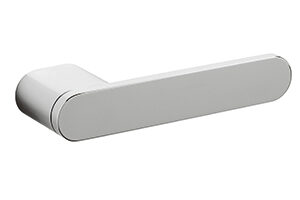When was the last time you truly considered how a door affects your perception of space? While we may select Italian interior doors for their aesthetic beauty, the psychological impact of these architectural elements runs far deeper than surface-level design. From the moment you cross a threshold, your brain processes countless visual and sensory cues that fundamentally shape how you experience and interact with interior spaces.
Recent advances in neuroarchitecture and spatial psychology reveal that interior door design significantly influences human cognition, emotion, and behaviour. For discerning homeowners, interior designers, and architects working on high-end residential and commercial projects, understanding the psychology behind Italian interior doors isn’t merely an intellectual exercise – it’s essential knowledge for creating spaces that truly resonate with occupants.
The Science Behind Spatial Perception and Door Design
Our brains are remarkably sophisticated at processing architectural elements, and doors play a pivotal role in this cognitive dance. The field of spatial psychology examines how we relate to and understand our built environments, and doors serve as critical markers in this psychological landscape.
Dr. Migette Kaup, an environmental psychologist and interior designer, notes that “architectural cues can provide reinforcement to the desired behaviours that we would like to see enacted in specific place types.” Italian interior doors, with their careful attention to proportion, material, and visual weight, exemplify this principle in action.
Research from cognitive neuroscience demonstrates that specific brain regions, particularly the parahippocampal place area, activate when we perceive and navigate architectural spaces. This neural activity isn’t simply about recognising physical boundaries – it’s about constructing a mental map of our environment, and doors serve as essential landmarks in that cognitive architecture.
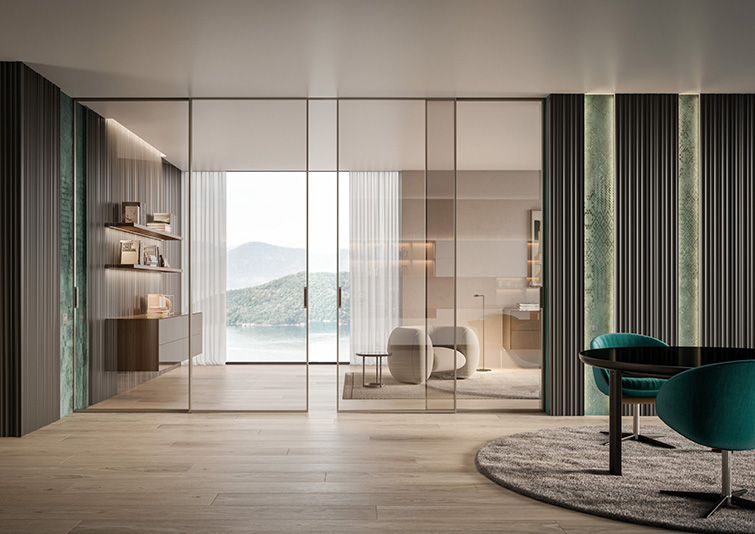
How Italian Interior Doors Manipulate Space Through Design Psychology
The Power of Threshold Moments
Italian interior doors create what spatial psychologists call “threshold moments” – psychological transitions that signal a shift in function, mood, or expectation. When you encounter a door from Eleganza’s Luna range, with its sleek aluminium profile and sophisticated glass finishes, your brain registers this as a significant spatial marker. The door becomes more than a barrier; it transforms into a psychological cue that prepares you for what lies beyond.
In luxury hotels and restaurants, these threshold moments are particularly crucial. A beautifully designed Italian interior door at the entrance to a private dining room or hotel suite immediately communicates exclusivity and refinement. The visual and tactile quality of these doors sets expectations and influences guest behaviour before they’ve even entered the space.
Visual Weight and Spatial Flow
The minimalist aesthetic that characterises many Italian interior doors – such as Eleganza’s Levia range with its double panel design and minimal aluminium profile – creates a sense of lightness that profoundly affects spatial perception. Research on spatial cognition suggests that architectural elements with reduced visual weight make spaces feel larger and more open, whilst maintaining necessary functional boundaries.
For residential applications, this becomes particularly valuable in modern homes where open-plan living requires subtle spatial definition. Italian interior doors in pocket or sliding configurations from the Click range offer the flexibility to reshape spaces at will, allowing homeowners to create distinct zones without the psychological heaviness of traditional swing doors. This adaptability addresses a fundamental human need: the ability to control one’s environment and create spaces that adapt to changing moods and functions.
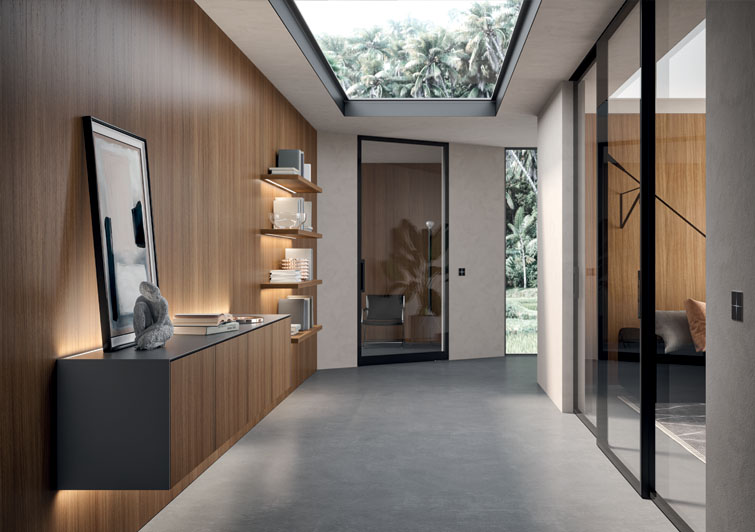
Material Psychology: The Language of Luxury
The materials used in Italian interior doors speak a sophisticated language that our brains decode instantly. Natural wood veneers, premium glass finishes, and refined metal accents all carry psychological associations that influence how we perceive and value a space.
When discerning homeowners select Italian interior doors crafted from the finest sustainable materials, they’re not simply making an aesthetic choice – they’re creating a multisensory experience that communicates quality, permanence, and attention to detail. This psychological impact extends beyond the visual; the weight of the door, the smoothness of its operation, and even the sound of its closure all contribute to an overall impression of luxury and refinement.
The Multisensory Impact of Italian Door Design
Contemporary spatial psychology recognises that our experience of architecture extends far beyond what we see. Italian interior doors engage multiple senses simultaneously, creating a richer, more memorable spatial experience.
Visual Rhythm and Architectural Harmony
The proportions and visual rhythm created by Italian interior doors significantly affect how we perceive adjacent spaces. Classical design principles – such as symmetry, balance, and proportion – map directly onto our cognitive structures, making spaces feel more coherent and legible.
Eleganza’s D35 range demonstrates this principle beautifully, with flush surfaces and clean lines that create visual continuity across an interior. This visual harmony reduces cognitive load, allowing occupants to feel more relaxed and at ease within the space. For commercial environments such as boutique hotels or high-end restaurants, this psychological comfort translates directly into guest satisfaction and brand perception.
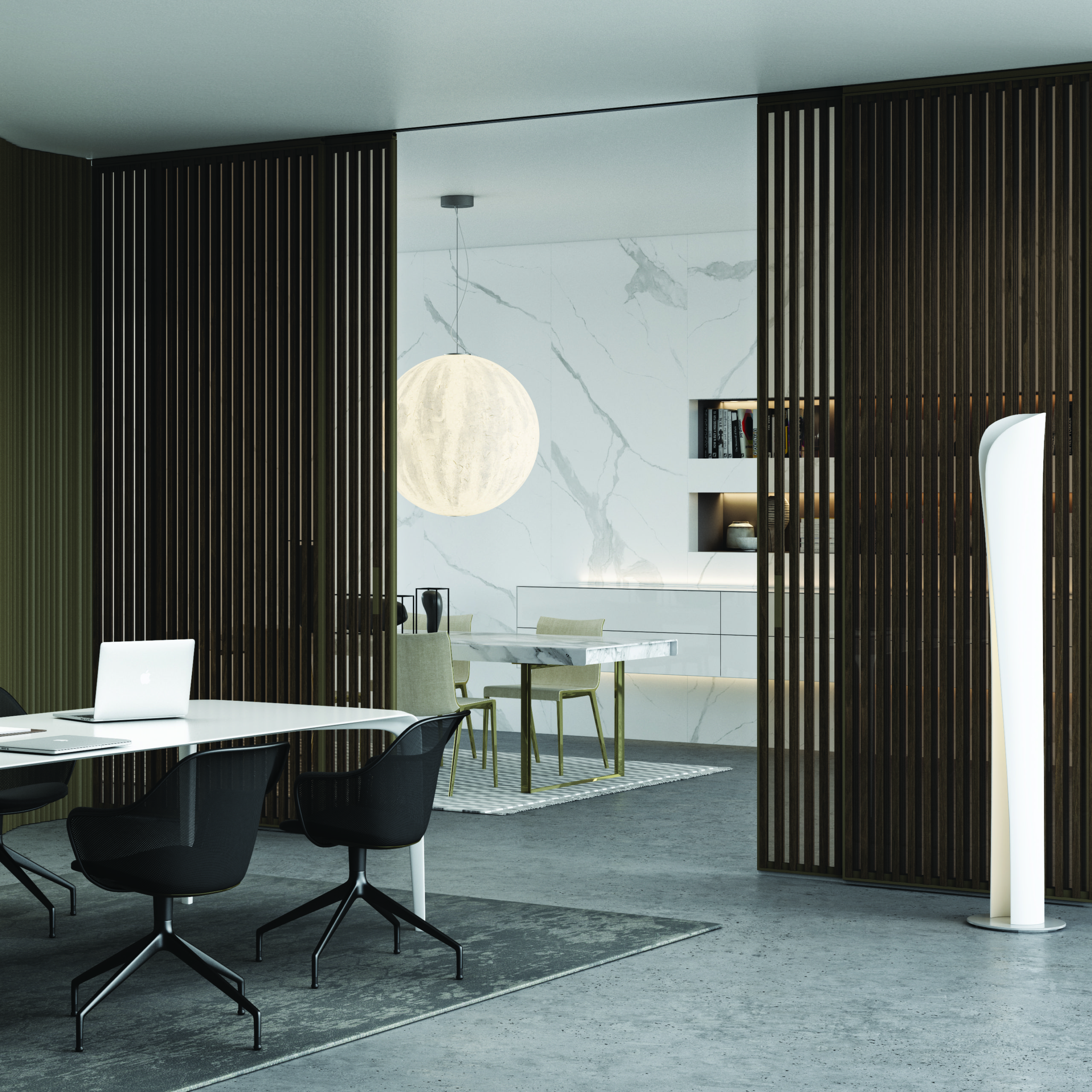
Light, Transparency, and Psychological Openness
The strategic use of glass in Italian interior doors creates fascinating psychological effects. Glass panels allow light to flow between spaces whilst maintaining acoustic and thermal boundaries. This transparency has profound psychological implications – it creates visual connections that make spaces feel larger and more integrated, whilst the physical barrier still provides a sense of security and privacy.
Research on environmental psychology demonstrates that natural light exposure significantly impacts mood, energy levels, and cognitive function. Italian interior doors that incorporate glass elements – particularly those from the Luna and Levia ranges – maximise light transmission, creating brighter, more uplifting environments that promote wellbeing and productivity.
Commercial Applications: Psychology in Hospitality and Retail
For architects and designers working on commercial projects, understanding door psychology becomes a strategic tool for influencing guest behaviour and experience.
Hotels: Creating Memorable Guest Experiences
In luxury hospitality, Italian interior doors serve as crucial touchpoints in the guest journey. The door to a hotel suite isn’t merely functional – it’s the threshold between the public hotel environment and the guest’s private sanctuary. High-quality Italian interior doors signal to guests that they’re entering a space of refinement and exclusivity.
The weight, sound, and visual impact of these doors all contribute to the overall brand experience. Eleganza’s Italian interior doors, with their precision-engineered mechanisms and premium materials, create those subtle moments of delight that distinguish exceptional hotels from merely adequate ones.
Restaurants: Defining Spatial Hierarchy
In restaurant design, Italian interior doors help create psychological hierarchies of space. Private dining rooms require doors that signal exclusivity whilst maintaining visual connection to the broader restaurant atmosphere. Sliding or pocket doors from Eleganza’s contemporary ranges offer flexibility – they can open spaces for visibility and energy during quieter periods, then close to create intimate, exclusive environments for private functions.
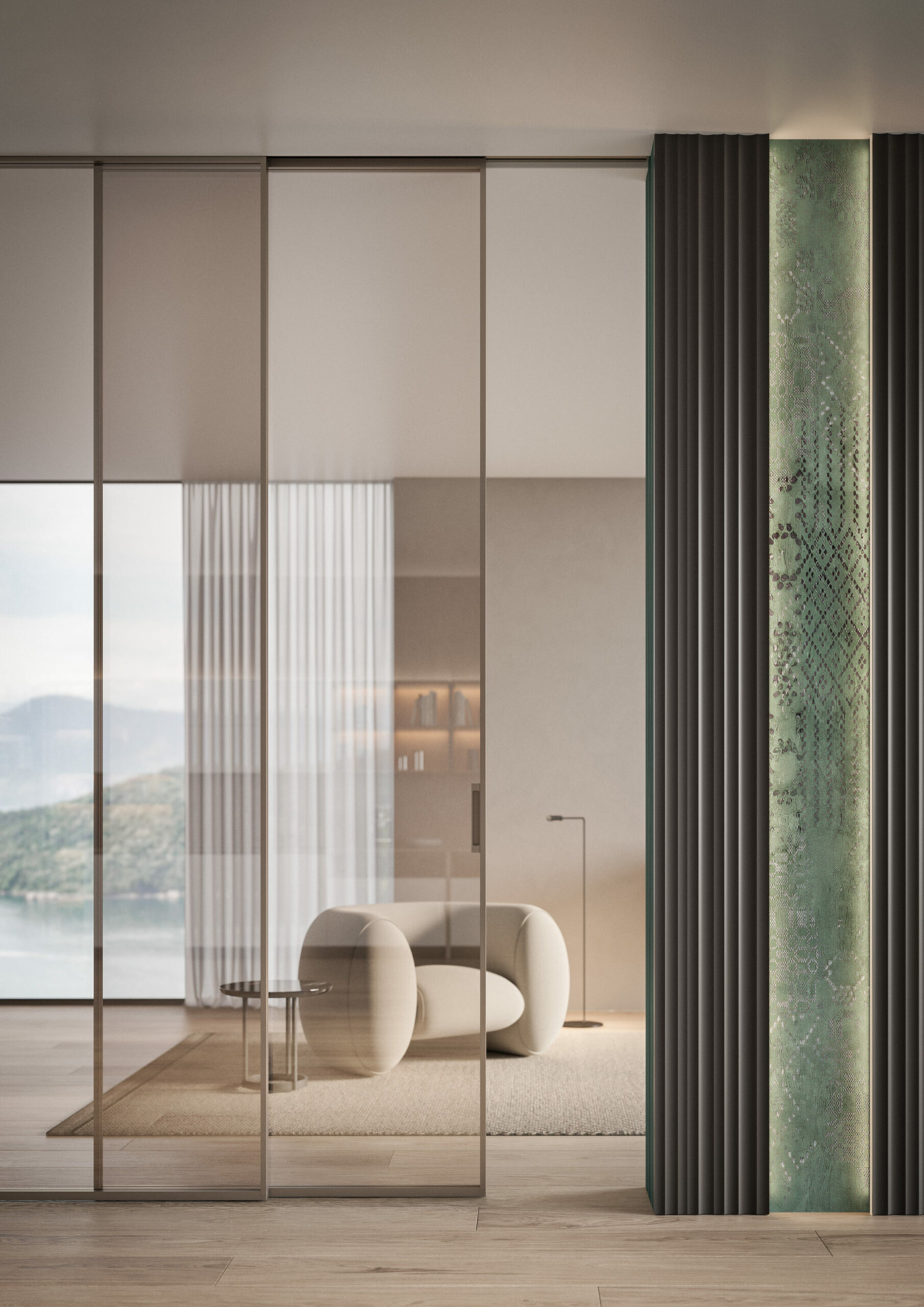
Italian Craftsmanship: The Psychology of Heritage and Quality
There’s a psychological dimension to choosing Italian interior doors that extends beyond their physical properties. Italian design carries centuries of heritage in craftsmanship, innovation, and aesthetic refinement. When clients select doors from manufacturers like Res Italia – with over 60 years of design expertise – they’re tapping into this rich cultural legacy.
This heritage creates psychological associations of quality, authenticity, and timeless design. For discerning homeowners and commercial clients alike, these associations add significant value beyond the functional benefits of the doors themselves.
Colour, Finish, and Emotional Response
The psychology of colour in interior design is well-established, and Italian interior doors offer remarkable flexibility in this regard. Eleganza’s extensive range of finishes, from natural wood veneers to custom lacquer colours, allows designers to precisely calibrate the emotional response these doors evoke.
Warm wood tones create feelings of comfort and natural connection – ideal for residential settings where homeowners seek sanctuary and relaxation. Contemporary lacquered finishes in neutral or bold colours can energise spaces or create sophisticated, modern atmospheres appropriate for commercial or contemporary residential projects.
The psychological impact of these choices shouldn’t be underestimated. Colour influences perceived room temperature, apparent space size, and emotional mood. Italian interior doors, with their superior finishing techniques, deliver colour and texture with a depth and richness that mass-produced alternatives simply cannot match.
Space Optimisation: The Psychology of Flexibility
Modern living and working environments demand flexibility – the ability to adapt spaces to changing needs, moods, and functions. Italian interior doors, particularly systems like Eleganza’s Click folding and sliding range, address this fundamental psychological need for environmental control.
Research in environmental psychology consistently demonstrates that perceived control over one’s environment strongly correlates with psychological wellbeing and satisfaction. When homeowners can easily reconfigure their living spaces – opening up for entertaining, closing off for privacy, or creating distinct zones for work and relaxation – they experience greater satisfaction with their homes.
For commercial applications, this flexibility becomes a strategic asset. Restaurants can adapt dining configurations throughout the day; offices can create meeting spaces on demand; hotels can offer guests customisable suite configurations. Italian interior doors make these transformations seamless and elegant.
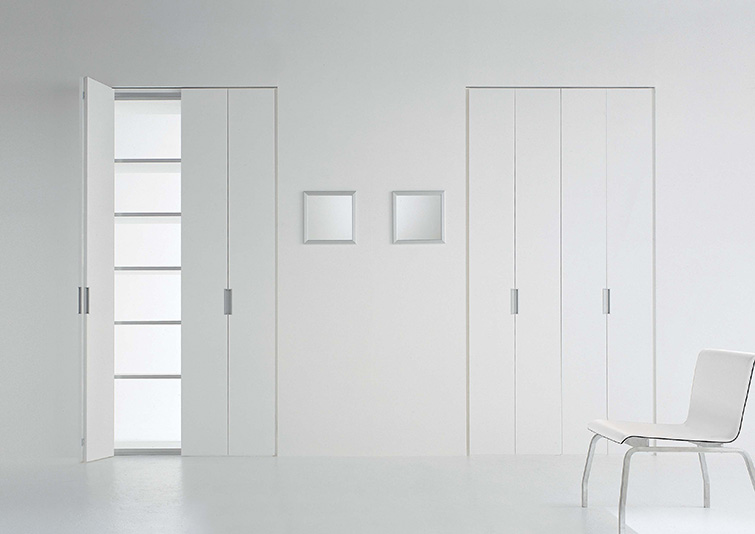
The Installation Factor: Psychology Meets Precision
Even the finest Italian interior doors can fail to deliver their psychological benefits if poorly installed. Eleganza’s commitment to professional, in-house installation recognises this crucial connection between technical precision and psychological impact.
When doors operate smoothly, close quietly, and align perfectly within their frames, they create subtle moments of satisfaction that accumulate over time. Conversely, doors that stick, slam, or visibly sag generate daily frustrations that undermine the overall quality of the space. The psychological impact of installation quality, whilst often invisible, profoundly affects long-term satisfaction with Italian interior doors.
Design Psychology for Different Property Types
Contemporary Residential: Minimalism and Mental Clarity
In modern homes that embrace minimalist design principles, Italian interior doors with clean lines and flush surfaces reduce visual clutter and promote mental clarity. The Levia range exemplifies this approach, creating boundaries without overwhelming the visual field. For homeowners seeking sanctuary from the complexity of modern life, these designs support psychological wellbeing through visual simplicity.
Period Properties: Respecting Heritage Whilst Embracing Modernity
Integrating contemporary Italian interior doors into period properties requires psychological sensitivity. The goal isn’t to mimic historical styles but to create respectful dialogue between old and new. Well-designed Italian doors can honour a property’s heritage whilst introducing modern functionality and spatial psychology principles. The key lies in selecting proportions, materials, and finishes that complement rather than compete with existing architectural features.
Commercial Luxury: Creating Brand Experience
For commercial projects in the luxury sector, Italian interior doors become part of the brand narrative. They communicate values – craftsmanship, attention to detail, commitment to quality – that align with broader brand positioning. Every interaction with these doors reinforces brand perception, making them strategic investments rather than mere functional necessities.
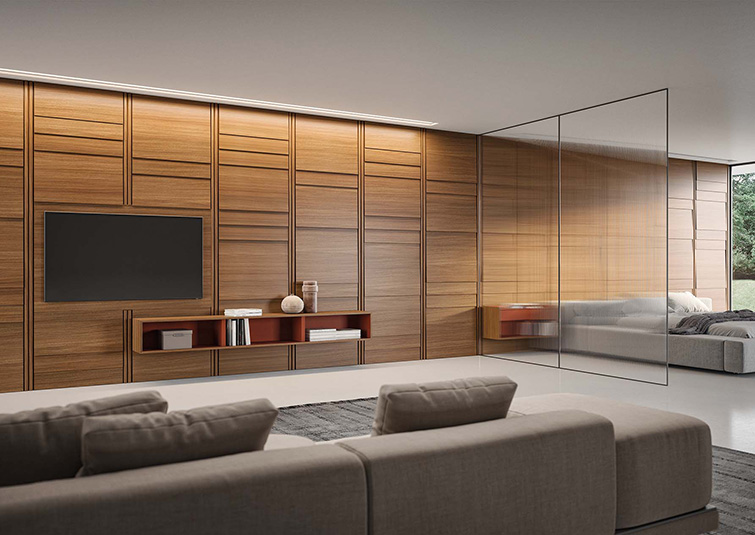
The Future: Spatial Psychology and Sustainable Design
As environmental consciousness grows, the psychology of sustainability adds another dimension to Italian interior door selection. Doors crafted from responsibly sourced materials carry psychological associations of ethical luxury – the satisfaction of making choices that align with personal values whilst maintaining aesthetic and functional excellence.
Eleganza’s use of premium materials from sustainable forests addresses this psychological need, allowing clients to experience luxury without compromise. This alignment between ethical values and design choices creates deeper satisfaction than aesthetic appeal alone could achieve.
Transform Your Spaces with Italian Interior Door Psychology
Understanding the psychology of door design empowers better decision-making for residential renovations, new builds, and commercial projects alike. Italian interior doors from Eleganza represent more than architectural elements – they’re carefully engineered tools for shaping spatial experience, influencing behaviour, and creating environments that truly serve their occupants.
Whether you’re designing a luxury home that needs to adapt to different moods and functions, creating a boutique hotel experience that guests will remember, or developing a restaurant space that balances openness with intimacy, Italian interior doors offer psychological sophistication alongside aesthetic beauty.
The interplay between craftsmanship, material quality, visual design, and spatial psychology makes Italian interior doors from Eleganza exceptional investments in both residential and commercial contexts. These doors don’t simply divide spaces – they enhance them, enriching daily experience through thoughtful design that honours both Italian heritage and contemporary spatial psychology principles.
Ready to Transform Your Space?
If you’re planning a project where the psychology of door design matters – whether it’s a luxury residential renovation, a boutique hotel development, or a high-end restaurant – the Eleganza team brings over 20 years of expertise in Italian interior door specification and installation.
We understand that selecting the perfect Italian interior doors involves balancing aesthetic vision, spatial psychology, practical requirements, and budget considerations. Our specialists are ready to guide you through our extensive range, helping you make informed decisions that deliver both immediate visual impact and long-term psychological satisfaction.
Get in touch today:
- Call: 07970 733992
- Email: hello@eleganzadoors.com
- Visit: Fill out the Message Us form below this article
Transform your spatial perception with Italian interior doors that truly understand the psychology of exceptional design.
